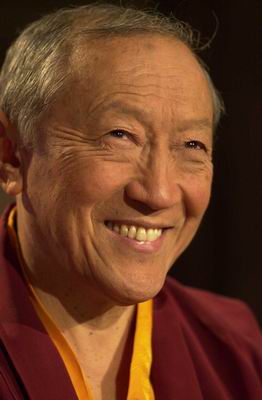Dagpo Rinpoche

Dagpo Rinpoche has followed thirty-four Buddhist masters, in particular the two tutors of His Holiness the Dalai Lama, Kyabje Ling Rinpoche and Kyabje Trijang Rinpoche, and His Holiness himself. Today, Rinpoche is one of the few masters who hold a large number of transmissions of the Buddha’s teachings. Rinpoche remained in Gomang Dratsang until the communist invasion in 1959 when he followed His Holiness the Dalai Lama into exile in India. In 1978, he founded his main Buddhist Dharma center, GuepeleTchantchoup Ling, in Paris where he has given extensive teachings since. Dagpo Rinpoche is often invited to teach in Dharma centres in Italy, Switzerland, Holland, Belgium , France, England, Canada, U.S.A., India, Indonesia and Malaysia.
The lineage of Dagpo Rinpoche’s previous incarnations goes far back into the past. It includes masters such as the famous Taktunu who in the previous Buddha’s time sold a piece of his own flesh to make offerings to his spiritual master. It also includes the Indian yogi Virupa, the scholar Gunaprabha and Atisha’s main spiritual guide: the great Suvarnadvipa Dharmakirti (Serlingpa). Suvarnadvipa gave Atisha the transmission of the teaching on bodhicitta whose lineage issues from Maitreya called “The Seven Point Instruction for the Generation of Bodhicitta” as well as one from Manjushri known as “Exchanging Self and Other”. The two masters found themselves together again in the same master-disciple relationship in more recent times when Atisha was born as Pabongkha Rinpoche and received teachings on bodhicitta from Dagpo Jamphel Lhundrup, Dagpo Rinpoche’s predecessor.
In Tibet, other better known masters in the lineage of Dagpo Rinpoche’s previous incarnations include the great fifth century translator Marpa Lotsawa, who founded the Kagyu school of Buddhism. He is famous as the teacher who guided Jetsun Milarepa to Enlightenment by very severe training. In more recent times, we count several abbots of Dagpo Shedrup Ling Monastery among Dagpo Rinpoche’s previous incarnations.
– Institut Ganden Ling – Veneux-les-Sablons – France




